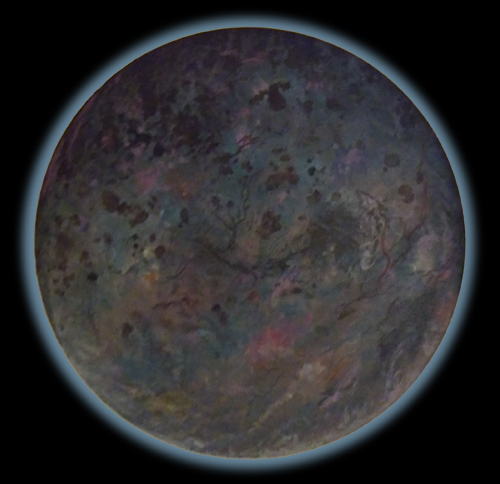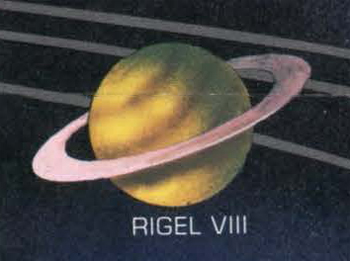499th to 100th Centuries BCE (FASA)
From Trekipedia
Reference Stardate -519/0001 Through -120/9912
52,999 BCE
- c.RSD -550 through -500 (c.52,999-47,999 BCE): The Second Interregnum occurs. The surface of Rigel IV is totally paved over.[1]
47,999 BCE
- c.RSD -500: The Querat civilization, located coreward, rises, although there is no incursion into the Orion Arm. Surface sculpting on Rigel III is completed, though the starting date is unknown.[1]
40,999 BCE
- c.RSD -430 through -400 (c.40,999-37,999 BCE): The Third Interregnum occurs.[1]
37,999 BCE
- c.RSD -400 through -200 (c.37,999-17,999 BCE): The Preserver Era. A largely unknown civilization to rimward seeds worlds around the Orion Arm with humanoid life forms, then disappears.[1]
31,999 BCE
- RSD -350: The Rigellians learn of the preponderance of humanoid races on both sides of the Orion Arm, though they do not suspect the reason why that is.[2]
17,999 BCE
- c.RSD -200 through -180 (c.17,999-15,999 BCE): The Fourth Interregnum occurs. Orions first appear.[1]
17,173 BCE
July
- RSD -192/7307.15 (15 July): A wandering Glath starship captain named Muark Tan brings to Rigel IV evidence of sentient humanoid life on Rigel VIII, including images, tools, weapons, clothing, and three live specimens. It is already too late to undo the tampering, as the value of Orion slaves was already making itself felt on the open market. Of all the races the Orions have known, the Rigellians never dealt in the sale of Orion slaves. The thought of the fortune the Rigellians passed up has always inspired deep reverential awe in the Orions.[2]
15,856 BCE
- RSD -179/56: The Treaty of Kammzdast begins the legal transfer of technology to primitive Orions and limits the use of mercenaries. Botchok is used as a proxy battlefield to allow peaceful development of the Rigel system.[1] The Rigellians sign the treaty in order to preserve peace in the Rigel system.[2]
15,839 BCE
- RSD -179/39: The First Rigel Conference relaxes some of the Kammzdast restraints and gives more training and technology to the Orions.[1]
13,681 BCE
- RSD -157/81: The Thirteenth Rigel Conference occurs. Only two original signatory cultures still exist by this date. The Orions receive more technology, and slave transport and lodgment rules are relaxed, permitting shipment to more planets. Rigel B/C planets are settled, but the lack of resources keeps the population low.[1]
12,227 BCE
- RSD -143/27: The Twenty-First Rigel Conference reinforces the ban on combat in the Rigel system, restricts secret slave transportation, vetoes the Rigellian Confederation, and grants Orions nuclear technology for use on Botchok.[1]
12,137 BCE
- RSD -142/37 through -142/17 (12,137-12,117 BCE): The Atom War and the Long Winter kill 80 percent of Botchok's population in 20 years. Proxy warfare is temporarily postponed.[1]
September
- RSD -142/3709.12 (12 September): Somchuk Nhat the Far-Sighted, a Gray Orion, calls the war an example of the failure of diplomacy to handle technological questions. The rebuilding of Botchok sees many Grays rise to high positions in business and government.[2]
12,089 BCE
January
- RSD -141/8901: The Twenty-Second Rigel Conference lifts the restrictions on slave transportation to allow repopulation of Botchok. Forced resettlement begins.[1]
10,429 BCE
- RSD -125/29: "Working groups" of Gray Orions are secretly lifted from Botchok to provide technological expertise on other planets. In less than a thousand years, their use (though against the Treaty of Kammzdast) will become widespread.[2]
Notes and References
- ↑ Jump up to: 1.00 1.01 1.02 1.03 1.04 1.05 1.06 1.07 1.08 1.09 1.10 Rogan, Peter R. (Author). The Orions: The Book of Common Knowledge. Star Trek: The Role Playing Game. Book 2008 . Cover art by David R. Deitrick. Illustrations by Jane Bigos, Dana Knutson, Todd Marsh, and Jim Nelson. FASA Corporation. 1987.
- ↑ Jump up to: 2.0 2.1 2.2 2.3 2.4 Rogan, Peter R. (Author). The Orions: The Book of Deep Knowledge. Star Trek: The Role Playing Game. Book 2008 . Cover art by David R. Deitrick. Illustrations by Jane Bigos, Dana Knutson, Todd Marsh, and Jim Nelson. FASA Corporation. 1987.

